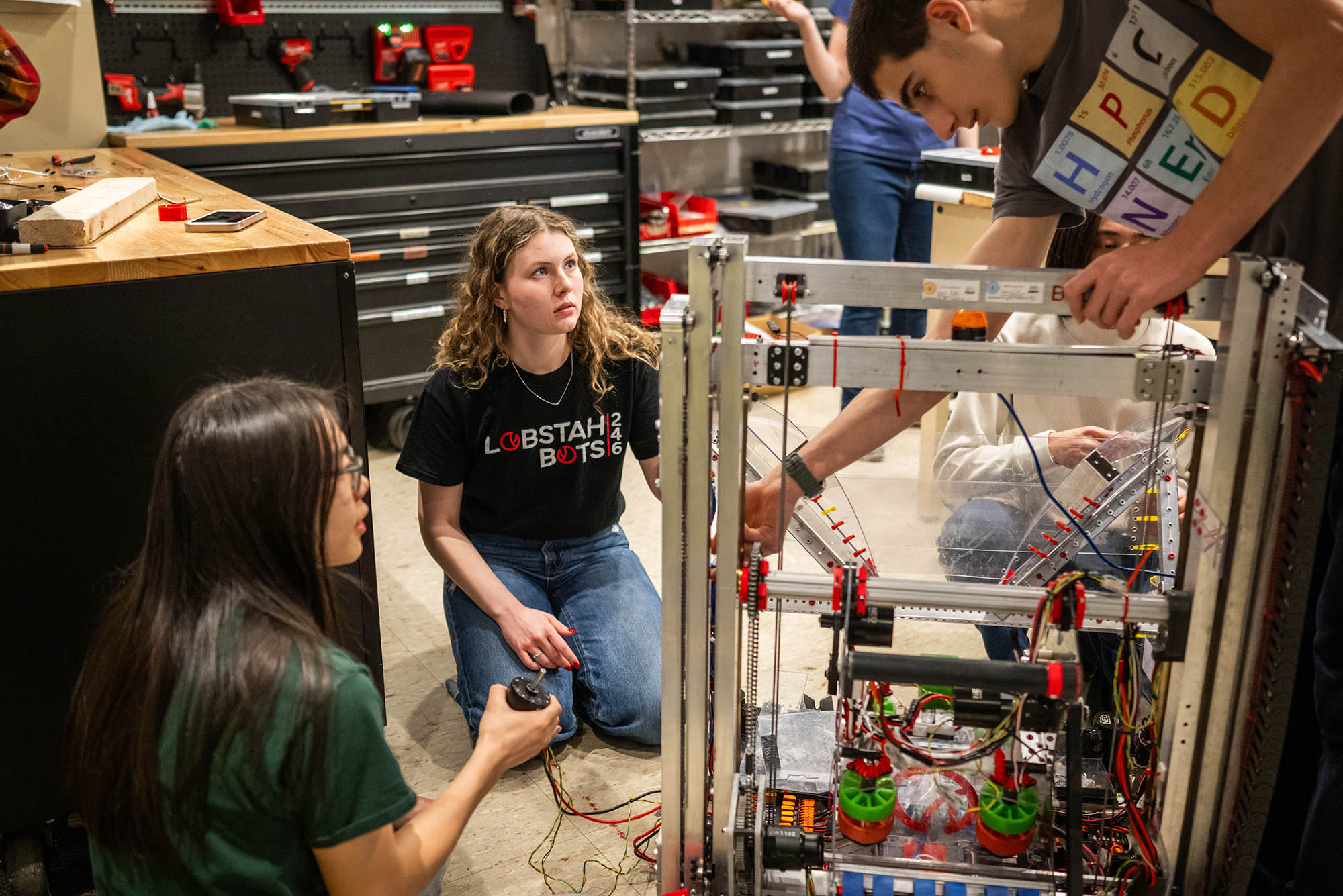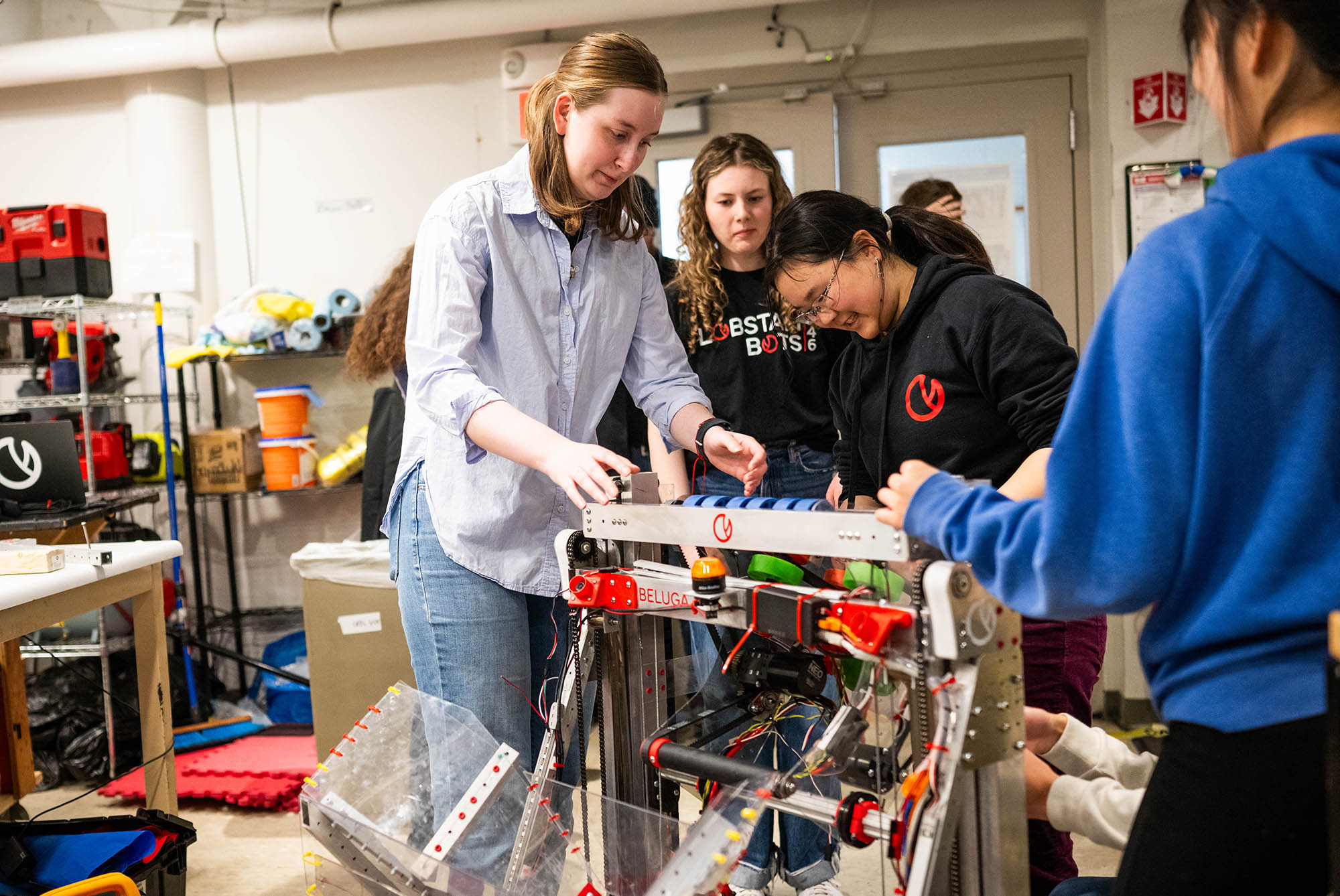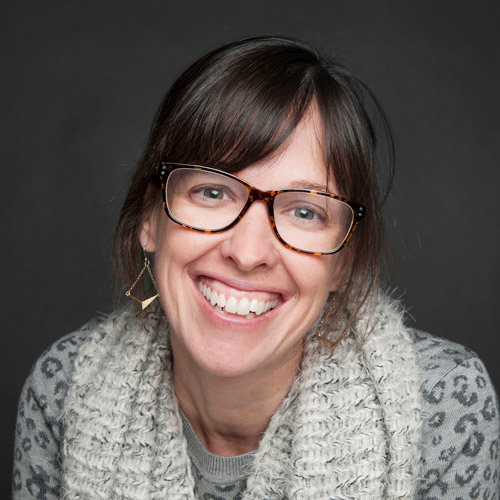ENG Students Mentor BU Academy and Match Charter School High Schoolers Heading to Robotics Competition
Students learn STEM skills through fun competition

Madison McDonald (ENG’26) works with students from BU Academy and Match Charter Public High School’s robotics team, Lobstah Bots, April 1. The team will be competing at the FIRST New England District Championship tournament in Springfield, Mass., starting April 3.
ENG Students Mentor BU Academy and Match Charter School High Schoolers Heading to Robotics Competition
Students learn STEM skills through fun competition
Toiling nearly every day after school for two months, a team of 20 high schoolers from Boston University Academy (BUA) and Boston’s Match Charter High School have been building a robot named Beluga in a workshop at BU’s College of Engineering. The robot, with lifting and grasping mechanisms, looks a bit like a giant Erector set on wheels. With guidance from a group of BU ENG undergraduate mentors, the team has earned high marks in FIRST Robotics scholastic competition this season, winning both an Excellence in Engineering Award and a Gracious Professionalism Award. And now, the team has headed to West Springfield, Mass., for the FIRST New England District Championship tournament.
ENG, through its Technology Inspiration Scholars Program (TISP), sponsors Match students and supports the team (nicknamed the Lobstah Bots) overall by sending their undergrad mentors to help in a hands-off way—troubleshooting and serving as sounding boards while the Lobstah Bots tinker and improve their robotic creation.
“They’re able to do pretty effective mentorship that almost feels invisible,” says BUA student Maxwell Yu, team colead on computer-aided design. “They’re not that much older than us, but they have more technical expertise, and they try to guide us by saying, ‘Have you considered this possibility?’ rather than, ‘You should do this.’”
The goal of both BU’s TISP and the national organization FIRST (For Inspiration and Recognition of Science and Technology) is to expose more young people to STEM fields—and all the possibilities in those fields for difference-making careers—through a fun, exciting extracurricular activity.
“Robotics is the only sport where every kid can go pro,” says Madison McDonald (ENG’26), one of the TISP volunteers.
In FIRST Robotics, students design, build, and program industrial-size, mobile, multifunctional robots to complete various tasks, such as lifting and delivering items, in themed competitions that mimic real-world robotic challenges. Robots are graded on various attributes by expert volunteer judges.
Although FIRST events are modeled in some ways on athletic contests—think of a raucous intramural track-and-field meet—they strive to avoid the pitfalls of often overly competitive youth sports. This isn’t the old Comedy Central show BattleBots, where robots bashed and disabled one another. “It’s the opposite,” McDonald says.
In fact, FIRST uses the term “coopertition” to capture the spirit of fairness and civility emphasized at events, as well as the structure of competition, in which each team is actually an alliance of three robots/schools fulfilling tasks in parallel.
In this year’s theme, “Dive,” the playing field represents a coral reef, and the robots are imagined as submarine robots seeding the reef with new coral—by placing wide PVC pipes atop narrower pipes at different height levels—and clearing it of algae (large gym-style bouncy balls).
“They learn resilience, problem-solving skills, leadership skills, teamwork,” says Michael Kelly, ENG’s STEM outreach manager. “They get used to working together across widely disparate subteams—some kids are into coding, some mechanical engineering, some electrical. Some really enjoy laser cutting and fabrication.”
The high schoolers machined all the parts of Beluga in BU’s Engineering Product Innovation Center (EPIC). “To truly learn something, you need the hands-on experience in addition to the theory,” McDonald says.
Beyond those hard skills, says Kelly, FIRST’s emphasis on gracious professionalism dovetails with BU ENG’s concept of the societal engineer. “When professionals use knowledge in a gracious manner and individuals act with integrity and sensitivity, everyone wins and society benefits,” reads the FIRST manual.

The experience of working with the Lobstah Bots has benefits for the mentors as well. “Mentoring has helped me contextualize my coursework,” says Carolyn Glasener (ENG’25). “I’m taking that theory and applying it to explain to them the reasoning behind the different design decisions they could make.”
It’s also simply heartening when her mentees learn and grow: “Seeing their confidence in both their personal lives and their engineering skills has been one of the most rewarding aspects of my time with this team,” Glasener adds.
Victoria Perrone, BUA’s director of BU partnerships, says the program has had a real impact. “The mentorship from BU undergraduates not only builds technical skills, but also brings a contagious enthusiasm to the lab,” Perrone says. “That shared passion and drive to build the best robot is what makes this partnership so special.”

Comments & Discussion
Boston University moderates comments to facilitate an informed, substantive, civil conversation. Abusive, profane, self-promotional, misleading, incoherent or off-topic comments will be rejected. Moderators are staffed during regular business hours (EST) and can only accept comments written in English. Statistics or facts must include a citation or a link to the citation.